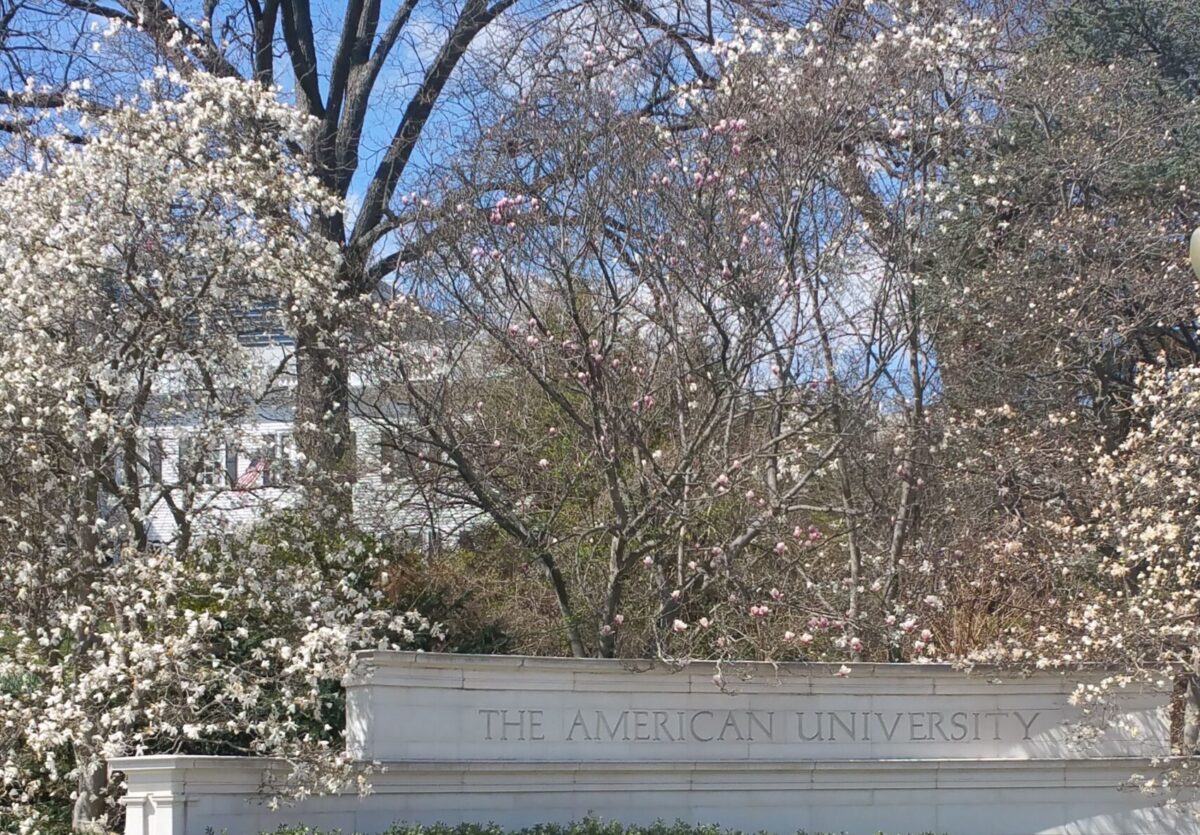Facing federal civil rights complaint, American U. announces actions to fight antisemitism
The new policy bars protests from university buildings, requires student groups to be ‘welcoming’ and requires posters on campus to relate to university events

American University
A week after a group of Jewish students submitted a complaint with a federal civil rights office alleging widespread antisemitism at American University, the school on Thursday unveiled a new set of policies meant to counter antisemitism and promote civil discourse on the Washington, D.C., campus.
The three new policies are content-neutral: Rather than specifically referring to antisemitism, they are meant to “support the sense of belonging on campus, promote safety, address the immediate challenges at hand and help build broader community for all,” said the email, authored by American President Sylvia Burwell and several other administrators. But an email sent to the university community made clear that the policies were created in response to recent events that “have made Jewish students feel unsafe and unwelcome.”
“We understand the pain and difficulty that has happened, we are dedicated to combating antisemitism and antisemitism will not be tolerated at American University,” Matthew Bennett, American University’s vice president and chief communications officer, said in an interview with Jewish Insider on Thursday.
The actions, which went into effect immediately, forbid protests inside university buildings, require student clubs and organizations to be “welcoming to all students” and require posters and university-sponsored events to “promote inclusivity.”
Pamela Nadell, a historian and the director of American’s Jewish studies program, said these actions are “a way of trying to begin to restore civil discourse on campus, so that we can fulfill our mission.” Nadell, who is writing a book on the history of antisemitism in America, worked with university administrators on the guidelines, alongside members of the campus Jewish community and outside experts from the Anti-Defamation League.
American’s actions stand in contrast to those undertaken at many other universities, which have put in place advisory boards and task forces focused on the issue but have not yet announced any new policies focused on combating antisemitism.
The test for American will be how the university enforces the new policies, particularly when administrators will have to weigh in on thornier questions like whether chants to free Palestine “from the river to the sea” are considered antisemitic or legitimate political speech.
“We have not issued a statement on that specifically, but what I can tell you is if your behavior in a protest disrupts safety, disrupts sense of belonging, we take action,” Bennett said.
Whether a club veers into unwelcoming territory would also depend on the context. In 2022, a group of student organizations at the University of California Berkeley law school who said that Zionists were not welcome. Bennett said that language, if employed at American, “would, of course, violate the rules.” Clubs who do not comply with the rules will lose official university recognition, the ability to use campus spaces and university funding.
The rule regarding posters comes as a handful Jewish students are under investigation by the university for an incident in which they recorded other students who tore down posters of Israeli hostages. Bennett said the university is reviewing the conduct of all individuals involved, including those who tore down the posters, but declined to comment further.
Going forward, posters must “be connected to university events and organizations,” Bennett said. This means that posters related to a cause — including posters of Israeli hostages — cannot be posted around campus.
“Just a general poster like that would not [be permitted]. If for example a university organization was hosting an event with a speaker about the hostages and the posters followed the policy, that would comply with the policy,” said Bennett.
One of the most common criticisms of American in the civil rights complaint filed with the Department of Education was that the university did not take students’ concerns seriously. In one instance, a student did not receive a response from the university after they complained about sitting in class with a fellow student who said they did “not want to sit on the same side of the room as this Zionist.”
“We’re making sure that if there is a report of an incident, we can move quickly on it, because that’s really important. Speed matters,” said Bennett. He declined to comment on the complaint beyond pledging that the university is taking it “very seriously.”










